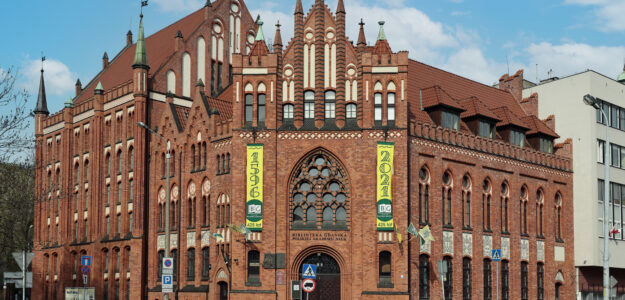
PAN Biblioteka Gdańska
Tagi: książki, sport
gdzie: ul. Wałowa 15, Gdańsk
godziny: 19-1
wstęp: bezpłatny
www.bgpan.gda.pl
Odkrywaj, zbieraj, wygrywaj! – U nas otrzymasz konkursową pieczątkę!
🇬🇧 Below
„W Noc Muzeów biegiem do Biblioteki”
Zmagania zapaśników, szermierzy, akrobatów i pokazy woltyżerki tej wyjątkowej nocy będzie można oglądać w PAN Bibliotece Gdańskiej. Wszystko to na kartach szesnasto- i siedemnastowiecznych druków na specjalnym pokazie w naszej Czytelni Zbiorów Historycznych.
Prezentację dawnego sportu dopełnią wykłady Dagmary Binkowskiej i Jana Daniluka.
Program
19:00-1:00
Pokaz starych druków inspirowanych sportem
Zabawy dla najmłodszych mi.in.: sportowe koło fortuny, projektowanie flo jeździeckich i maskotek olimpijskich
Kuratorskie oprowadzanie po wystawie „Szybciej, wyżej, mocniej! Polskim sportowcom i olimpijczykom”
Pokaz sprzętu lekkoatletycznego
Wykłady:
19:15-20:15 Dr Dagmara Binkowska „Blaski i cienie bycia sportsmenką. O początkach sportu kobiecego”
20:30-21:30 Dr Jan Daniluk „Sport w niemieckich obozach jenieckich w latach II wojny światowej
„Biegiem do Biblioteki” – pod takim żartobliwym hasłem odbędzie się nasza tegoroczna Noc Muzeów. Podobnie jak w poprzednich latach najważniejszą częścią wieczoru będzie wyjątkowy pokaz starych druków i grafik związanych z historią sportu. Wśród nich między innymi podręcznik do zapasów z 1539 roku ilustrowany przez Lucasa Cranacha Młodszego. Jak duże znaczenie ma sport dla człowieka, świadczą także używane od setek, a nawet tysięcy lat powiedzenia np. „chleba i igrzysk”. Autorem tych słów był rzymski poeta Juwenalis, którego „Satyry” wydane w 1497 roku będzie można zobaczyć tego wieczoru.
Jakie sporty preferowały i jak się ubierały dbające o kondycję damy XIX i pierwszej połowy XX wieku? Na te pytania odpowie prelekcja dr. Dagmary Binkowskiej poświęcona początkom sportu kobiecego: od modnych rozrywek po narodziny idei wychowania fizycznego dziewcząt, z których grona sto lat temu wyłoniły się pierwsze sportsmenki i medalistki.
Piłka nożna, ręczna i siatkówka, baseball, softball, hokej na lodzie, pływanie, biegi, ping pong i petanque – to najpopularniejsze, ale nie jedyne dyscypliny sportowe uprawiane za drutami niemieckich obozów jenieckich w latach II wojny światowej. Jak rozwijał się sport, jaką funkcję pełnił w życiu jeńców oraz skąd brali niezbędny sprzęt sportowy? Opowie na swym wykładzie dr Jan Daniluk.
Rok 2024 Sejm RP ogłosił Rokiem Polskich Olimpijczyków. Nocy Muzeów towarzyszy wystawa dedykowana naszym sportowcom, po której oprowadzą jej autorzy. Jak zawsze nie zabraknie też atrakcji dla najmłodszych. Sportowe koło fortuny, projektowanie flo jeździeckich i maskotek olimpijskich to kilka z naszych propozycji.
🇬🇧
On the Night of Museums, run to the Library!
On this special night, visit PAS Gdańsk Library to see fights of wrestlers, swordsmen, acrobats and equestrian vaulting. You will be able to see all of the above on the pages of 16th- and 17th-century printed books during a special show in our Historic Collections Reading Room. Presentation of sports from the past will be accompanied by lectures by Dagmara Binkowska and Jan Daniluk. This year’s Night of Museums will be held under the humorous title Run to the Library. Just like during the previous editions of the event, the highlight of the evening will take the form of a unique presentation of early printed books and prints related to the history of sports, including a 1539 wrestling textbook illustrated by Lucas Cranach the Younger. The significance of sports is also expressed in sayings used for centuries or even millennia such as bread and games. These words were authored by the Roman poet Juvenal, whose Satires issued in 1497 will be on display for the visitors during the event. What sports were preferred by ladies wishing to keep fit in the 19th century and the first half of the 20th century, and what did they wear? Answers to these questions will be provided by dr Dagmara Binkowska during her lecture devoted to the beginnings of women’s sports: from fashionable entertainment to the birth of the idea of physical education for girls, resulting in the appearance of the first sportswomen and female medallists one hundred years ago. Football, handball, volleyball, baseball, softball, ice hockey, swimming, running, table tennis and pétanque are the most popular but by no means only sport disciplines practiced behind the barbed wire of German prisoner-of-war camps during the Second World War. How did sport develop there, what function did they play in the life of the prisoners-of-war and where did they take their sports equipment from? These issues will the subject of dr Jan Daniluk’s lecture. The Polish Sejm proclaimed 2024 the Year of Polish Olympic Champions. Our Night of Museums will also be accompanied by an exhibition devoted to our sportsmen and sportswomen, with its authors offering guided tours. As always, we will also provide some attractions for children, including a sports wheel of fortune, and a possibility to design flots and Olympic mascots.
Please join us in the historic building of the PAS Gdańsk Library (ul. Wałowa 15) at 19:00-1:00 on Saturday, 18 May 2024. Admission free.